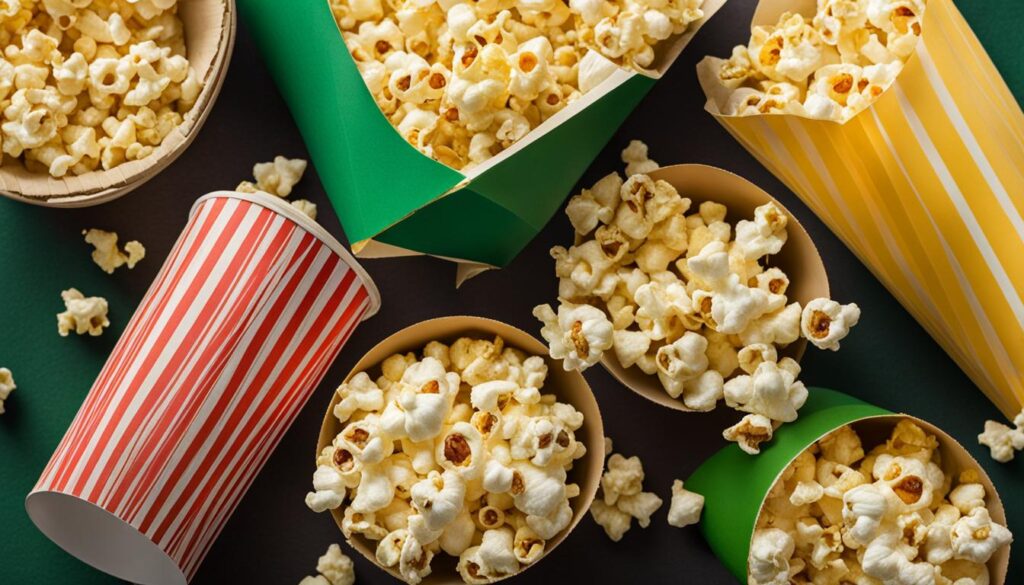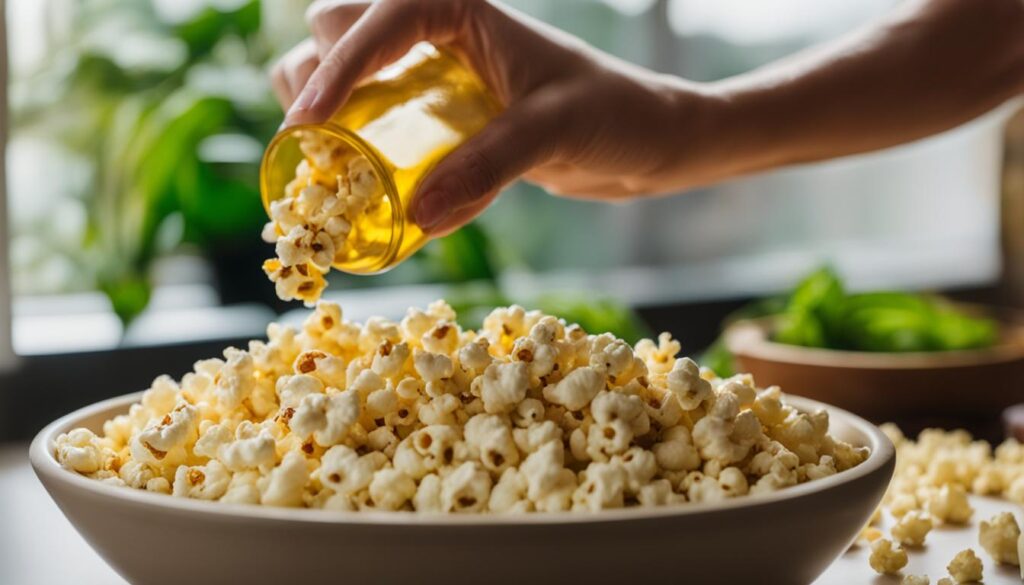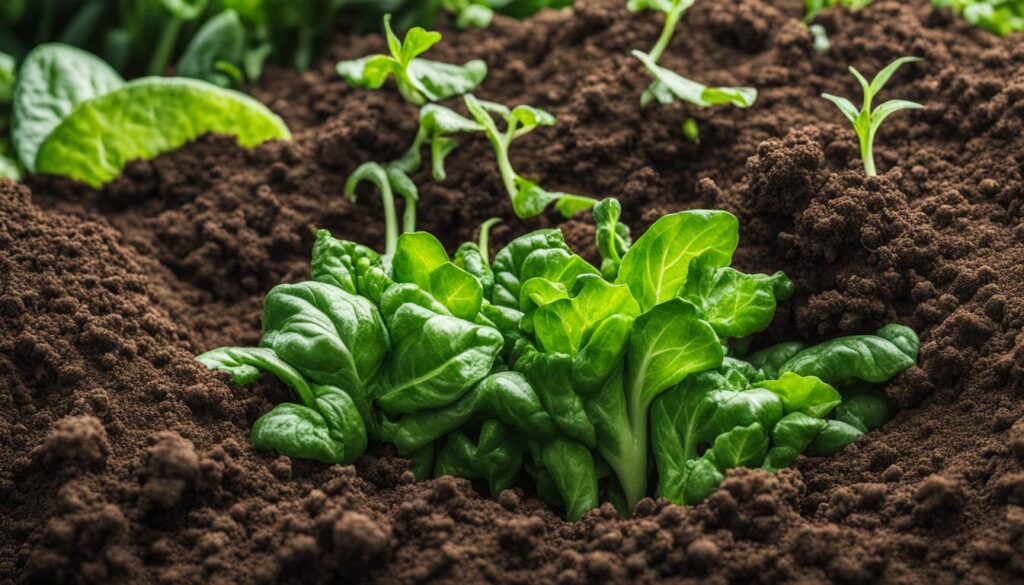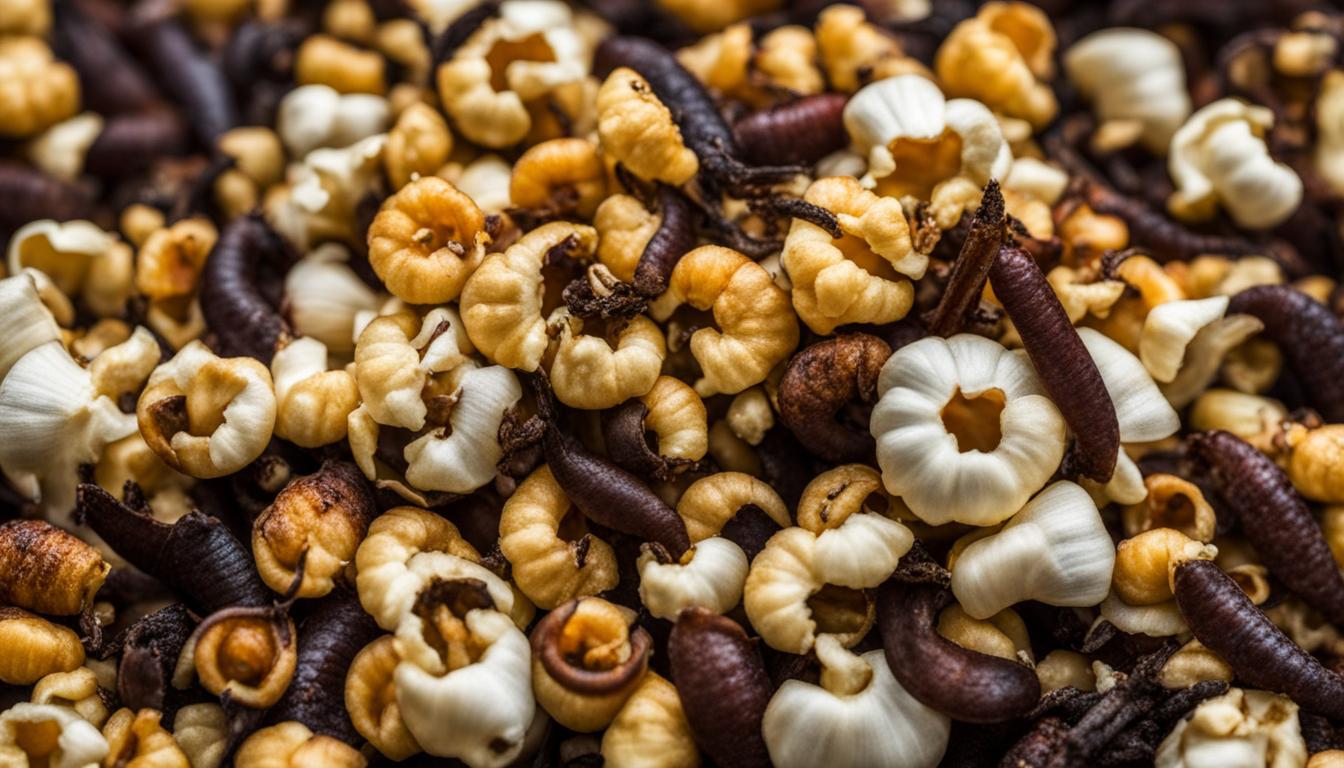Greetings! Are you wondering what to do with your leftover popcorn? Well, we have good news for you. Popcorn can actually be composted, providing an eco-friendly solution to disposing of old popcorn. So, before you toss it in the trash, let us guide you on how to compost popcorn and reduce waste in a sustainable manner.
Key Takeaways:
- Composting popcorn is an environmentally-friendly way to dispose of old popcorn.
- Popped popcorn decomposes in about 20 to 30 days, while unpopped kernels take longer.
- Stick to plain popcorn for composting, as toppings can affect the compost quality.
- Microwave popcorn bags are not compostable due to the chemicals used in their production.
- Expired popcorn kernels can be added to compost or repurposed for creative projects.
Why Compost Popcorn?
Composting popcorn offers numerous benefits that make it a great choice for eco-friendly popcorn disposal and organic waste management. By composting popcorn, you not only find a proper way to dispose of old popcorn but also contribute to reducing waste and diverting it from landfills. This sustainable method enriches the soil with organic matter, creating a nutrient-rich environment that promotes soil health and fertility.
When you compost popcorn, you are also playing a role in reducing methane emissions from landfills. Food waste, including popcorn, produces methane when it decomposes in anaerobic conditions. By diverting popcorn from landfills through composting, you help to minimize methane emissions, which is crucial for mitigating climate change and promoting a healthier environment.
Furthermore, composting popcorn allows you to create a more sustainable and resilient garden. The nutrient-rich compost resulting from the decomposition of popcorn enriches the soil, providing essential nutrients to plants. This helps to improve plant growth, increase yields, and maintain healthy soil for a thriving garden. Composting popcorn is not only good for the environment but also for your garden’s overall health and productivity.
How to Compost Popcorn?
If you’re wondering about the best way to compost popcorn, we’ve got you covered. Composting popcorn is a simple process that can help you effectively dispose of your old popcorn while benefiting the environment. Here are some tips to get you started:
- Start with plain popcorn: When composting popcorn, it’s important to use plain popcorn without any sugary or buttery toppings. These additives can attract pests and affect the quality of the compost.
- Add it to your compost pile: Once you have plain popcorn, you can add it directly to your compost heap or bin. Bury the popcorn under other compostable materials to prevent animals from accessing it.
- Maintain the right balance: To ensure successful composting, maintain the right balance of carbon and nitrogen in your compost pile. You can achieve this by adding other green materials like vegetable scraps or grass clippings.
Remember that composting popcorn can take around 20 to 30 days for popped kernels to decompose, while unpopped kernels may take longer. Regularly monitoring and maintaining your compost pile will help speed up the decomposition process. By following these composting tips, you can make the most of your old popcorn and contribute to sustainable waste management.
Incorporating popcorn into your composting routine not only helps reduce waste but also enriches the soil with valuable nutrients. So grab your popcorn and start composting today!
Alternative Uses for Expired Popcorn
When it comes to expired popcorn kernels, there’s no need to let them go to waste. Instead of throwing them away, consider repurposing them in creative and fun ways. Here are some alternative uses for expired popcorn that you may not have thought of:
Making sensory bottles
Expired popcorn kernels can be used to create sensory bottles, which are a great sensory play activity for young children. Simply fill a clear plastic bottle with the kernels and add other small items like buttons, beads, or small toys. Seal the bottle tightly and let your little ones shake, roll, and explore the different textures and sounds inside.
Creating craft projects
Old popcorn kernels can be put to use in various craft projects. Glue the kernels onto a picture frame or a cardboard cutout to create a unique texture. You can also paint the kernels and string them together to make colorful popcorn necklaces or garlands. Let your creativity run wild and turn your expired popcorn into beautiful works of art!
Using as packing material
If you’re in need of some packing material, expired popcorn kernels can come to the rescue. They can be used as a cushioning agent when shipping fragile items or as a natural and biodegradable alternative to traditional packing peanuts. Not only does this repurpose your old popcorn, but it also helps reduce waste in the packaging process.
By finding alternative uses for expired popcorn, you can breathe new life into something that would have otherwise been discarded. Whether it’s through sensory play, crafting, or repurposing as packing material, get creative and give your old popcorn kernels a second chance to shine.
What About Popcorn Bags?

When it comes to composting popcorn, it’s important to consider the proper disposal of popcorn bags as well. Unfortunately, microwavable popcorn bags are not compostable. Despite their paper-like appearance, they contain chemicals such as perfluorooctanoic acid (PFOA) and perfluorooctane sulfonate (PFOS) that make them unsuitable for composting. These chemicals can contaminate the compost and harm the environment.
So, what can you do with popcorn bags? The best way to dispose of them is by following the recommended recycling practices in your area. Many municipalities accept popcorn bags for recycling, as they can be recycled as mixed-paper waste. Be sure to check with your local recycling center or waste management facility for specific instructions.
To further reduce waste and promote sustainability, consider using eco-friendly alternatives to popcorn bags. One option is to make your own popcorn using stovetop methods, a popcorn machine, or a reusable silicone microwave popper. These alternatives eliminate the need for single-use bags, helping you minimize your environmental impact.
Proper Disposal of Popcorn Bags:
- Check with your local recycling center for instructions on recycling popcorn bags as mixed-paper waste.
- Avoid composting popcorn bags as they contain chemicals that can contaminate the compost.
- Consider making your own popcorn using stovetop methods, a popcorn machine, or a reusable silicone microwave popper to reduce waste.
Eco-Friendly Alternatives to Popcorn Bags:
- Make your own popcorn using stovetop methods or a popcorn machine.
- Use a reusable silicone microwave popper instead of single-use bags.
- Explore other sustainable options, such as air poppers or popcorn kernels in bulk packaging.
Reviving Stale Popcorn

Have you ever found a bag of stale popcorn hidden in the back of your pantry? Instead of throwing it away, there are simple methods to revive stale popcorn and bring back its crunchiness. Whether you prefer using a microwave, oven, stovetop pan, or a popcorn warmer, each method can help you salvage your popcorn and enjoy it once again.
Methods to Revive Stale Popcorn:
- Microwave method: Place the stale popcorn in a microwavable dish and cover it with a moist paper towel. Heat it for a specific time, checking intermittently until it regains its crunchiness.
- Oven method: Spread the stale popcorn on a baking sheet and bake it in the oven at a low temperature for a few minutes. Keep an eye on it to prevent it from burning.
- Stovetop pan method: Heat a pan over medium heat and add the stale popcorn. Cover the pan and shake it periodically to evenly distribute the heat. Once the popping sound decreases, remove the pan from the heat and let it cool.
- Popcorn warmer method: If you have a popcorn warmer, place the stale popcorn in the warmer and let it heat for a certain duration until it becomes crispy again.
These methods work by applying heat to remove any moisture that has caused the popcorn to lose its crisp texture. Experiment with different methods to find the one that suits your preference and equipment. With a little time and effort, you can enjoy your once-stale popcorn as if it were fresh!
Maintaining Healthy Soil with Compost

When it comes to gardening, maintaining healthy soil is essential for the success of your plants. One effective way to achieve this is by incorporating compost into your soil. Compost, including composting popcorn, offers numerous benefits for soil health. It acts as a natural fertilizer, enriching the soil with essential nutrients that plants need to thrive. By adding organic matter to the soil, compost improves its structure, allowing for better water retention and drainage.
Using compost in your garden also promotes the growth of beneficial microorganisms. These microorganisms break down organic matter in the soil, making nutrients more readily available to plants. This helps to create a nutrient-rich environment that supports healthy plant growth and development. Compost also enhances soil fertility over time, reducing the need for synthetic fertilizers and creating a sustainable approach to gardening.
Benefits of Compost for Soil Health:
- Enriches soil with essential nutrients
- Improves soil structure and water retention
- Enhances the growth of beneficial microorganisms
- Reduces the need for synthetic fertilizers
- Creates a sustainable approach to gardening
By incorporating compost, including composting popcorn, into your gardening routine, you are not only nourishing your plants but also contributing to the overall health and fertility of your soil. The organic matter provided by compost helps to create a balanced ecosystem in the soil, supporting the growth of a wide variety of plants and promoting a thriving garden. So, be mindful of how you dispose of your old popcorn and consider composting it to maintain healthy soil and create a sustainable garden environment.
Conclusion
Composting popcorn offers numerous benefits for eco-friendly popcorn disposal and sustainable waste management. By choosing to compost, you play an active role in reducing waste and diverting it from landfills. This not only helps to minimize the environmental impact but also contributes to the overall health of our planet.
In addition, composting popcorn enriches the soil with valuable nutrients, creating a fertile environment for plants to thrive. It improves soil structure, water retention, and the overall health of your garden. By incorporating compost into your gardening routine, you can enjoy healthier plants and bountiful yields.
Reviving stale popcorn is another practical solution to minimize food waste. Instead of discarding it, you can use various methods to bring it back to life and enjoy its crispy goodness. This allows you to make the most of every kernel, reducing food waste and promoting sustainability.
Whether you choose to compost popcorn, revive stale kernels, or find alternative uses for them, embracing these practices contributes to a greener lifestyle and sustainable waste management. Together, we can make a positive impact on the environment and create a healthier planet for future generations.
FAQ
Can you compost popcorn?
Yes, popcorn can be composted. Plain popcorn can be added directly to your compost heap or bin.
Why should I compost popcorn?
Composting popcorn offers several benefits, including reducing waste, diverting it from landfills, and enriching the soil with organic matter.
How do I compost popcorn?
To compost popcorn, add it to your compost heap or bin, burying it under other compostable materials to prevent animal access. Remove sweet and sticky toppings before composting.
Are there alternative uses for expired popcorn?
Yes, expired popcorn kernels can be repurposed for craft projects or used as sensory bottles. They can also be given to pets or farm animals in small amounts.
Can I compost popcorn bags?
No, microwave popcorn bags are not compostable due to the chemicals used in their production. Follow recommended recycling practices for proper disposal.
How can I revive stale popcorn?
Stale popcorn can be revived using various methods, such as microwaving, oven heating, stovetop pan heating, or using a popcorn warmer.
How does compost help maintain healthy soil?
Compost improves soil structure, water retention, nutrient content, and increases beneficial microorganisms, creating an ideal environment for plant growth.
Why should I compost popcorn?
Composting popcorn is a sustainable and eco-friendly way to dispose of old popcorn, reducing waste and contributing to organic waste management.

Leave a Reply